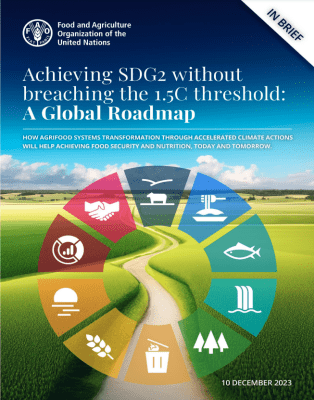THE United Nations has released a “global agrifood roadmap” at the COP28 conference in Dubai that aims to eradicate global hunger and nutrition while transforming agrifood systems from a net emitter to a carbon sink.
Download summary of the roadmap (PDF) here.
The roadmap recognises that livestock are essential to feeding world and play a vital role in environmental functions such as maintaining soil carbon content and fertility.
But it also maintains that more must be done to lower the sector’s climate impact, and identifies 10 “domains of action” where it says concrete steps are required.
Livestock is one of these domains. The report recognises livestock play a crucial economic role contributing to the livelihoods of about 1.7 billion poor people, and are a source of high quality protein and micronutrients that are essential for normal development and good health.
At the same time, it says the sector is responsible directly for 26 percent of agrifood system emissions.
It aims for methane emissions from the livestock sector in 2030 to be 25 percent lower than 2020 levels, and by 2050, for total factor productivity for livestock to have grown by 1.7pc per year globally.
To achieve this it nominates the following steps:
- Improve livestock productivity through better genetics
- Intensify livestock production in relevant locations and improve feeding practices
- Protect animal health through improved veterinary services and animal disease surveillance
- Change the feed industry and promote new sources of proteins for feed
- Restore degraded pasture and improve grazing management practices
- Change the livestock population to match not only nutritional needs but also the environmental opportunities and constraints
- Make changes towards integrated production regimes such as an integrated sylvopastoral production regime
- Improve the adoption of certification and labeling schemes
- Change public livestock farm policies to be realigned with previous objectives
The roadmap says there is a “need to act urgently and change the narrative”: “Without immediate actions, it is improbable the goal of limiting global warming to 1.5C above pre-industrial level could be achieved.”
The roadmap is the first part of a three year process which will culminate in the release of individual “Country Action Plans” at COP30 in Brazil in 2025.
The document perhaps unintentionally underscores the extent to which global perceptions of agriculture have lost sight of the fundamental reason the sector exists – to feed the world – noting many view the sector only in terms of climate and environmental impacts:
“The roadmap aims to revolutionise the perception of agrifood systems, transcending the conventional view of a sector contributing to emissions and environmental degradation.
“Instead, it advocates for a profound understanding: historically, agrifood systems have been the sustenance providers. The food they yield is indispensable for human survival on this planet.
It says agrifood systems must be prioritised – on the one hand to assure the right to food, but on the other, because the sector is seen as the one “that can improve the most” in terms of reducing human burden on nature and climate.
It also calls for a significant increase in climate-related finance to improve innovation in the agrifood sector, with only 4% of climate finance currently going to agrifood.
Boosting production to meet food security and nutrition needs should not come at the expense of depleted natural capital and increased emissions, the roadmap states.
“The agrifood system has the potential to actively contribute to global mitigation efforts, but substantial endeavours are essential in adaptation to achieve increased productivity with reduced resource consumption.”
It says the strategy will require altering production methods, adjusting consumption patterns, refining forestry management practices, and integrating innovative technologies such as carbon capture.
The roadmap does not call for a reduction in the consumption of meat as some had speculated may happen leading up to this year’s global climate policy event.
Rather it focuses on “the imperative to chart pathways to lower the greenhouse gas emissions produced by the world’s livestock systems”, with the aim of producing more with less emissions.
More information:
UN Global Roadmap for Agrifood Systems
New FAO report maps pathways towards lower livestock emissions


HAVE YOUR SAY